- Home
- Michael Grant
Front Lines Page 33
Front Lines Read online
Page 33
“Why us?” Jenou asks.
“You were in the right place.”
“Wrong place, more like it,” Tilo says.
Far up ahead the jeep has reached the pass.
It blows up.
34
RIO RICHLIN—TUNISIAN DESERT, NORTH AFRICA
The ground beneath the jeep just explodes upward, sending the jeep cartwheeling. It turns in midair. Rio sees bodies thrown like dolls.
“Hit the dirt!” Cole yells.
The jeep slams down and explodes again. This time it slams into the wall of the canyon. A body, Rio can’t tell whose, flies free and smashes against the canyon wall. It slides down like some figure in a cartoon. Like it’s adhesive.
“Minefield!” Cole shouts. “Everybody freeze. Nobody moves.”
GIs strain to see if anyone is moving up ahead. The pass is in shadow but the jeep burns now, burns and casts an eerie orange light that does not show movement other than the drift of disturbed sand and a small, indistinguishable desert creature that sensibly scuttles away.
Lieutenant Helder from Third Platoon along with the various sergeants huddle up, once they’re sure this isn’t artillery or an air raid. The general consensus is that they have to send someone forward to check for survivors, but once that’s done they should abandon this stupid mission, get back to the road, and find their way to the main body of the army, wherever the hell that may be.
Rainy disagrees. “The orders I’m carrying come from Colonel Clay, with the full authority of General Fredendall.” This is a bit of an exaggeration, but only a bit. “Those orders say we go find this supply column. And it’s through that pass.”
“You want to stroll through that pass, Headquarters?” Sergeant Garaman demands. “That’s a minefield. Now, maybe it’s just antitank mines, but maybe it’s antipersonnel mines, too, and I don’t see any engineers here.”
“Don’t go through the pass? Then climb the hills on either side.”
“In the dark? Shadows are already long, and night comes on fast out here, this time of year. We’ll lose half a dozen men just from broken bones.”
“The orders are clear,” Rainy shoots back.
“Well, your colonel isn’t the one who has to find a way through, now is he? He ain’t here, he’s in the rear with some A-rab whore pulling his pud.”
Garaman and Schulterman continue to argue, and Helder continues to show every sign of being a man overwhelmed, while Cole borrows a pair of binoculars and scans the two sides of the pass.
“Anyone here ever done any mountain climbing?” Cole asks, interrupting the increasingly heated flow of invective.
Rio has not, but Hansu Pang raises his hand. So does a corporal from another squad.
“What are you thinking, Jedron?” Garaman asks, relieved to have an excuse to end the absurd shouting match with a woman half his size.
“I’m thinking that cliff right there isn’t but thirty, forty feet high,” Sergeant Cole says. “A man could carry a rope up there.”
The NCOs pass the binoculars back and forth, pausing to cast suspicious glances at Private Pang.
“We’re supposed to trust a fugging Jap?” someone asks, making the suspicions explicit.
“He’s an American,” Cole says, casting his own suspicious look at Pang, who stands stock-still, jaw clenched.
“I’m actually—” Hansu begins, but is cut off.
“He could get to the top and signal anyone on the other side,” Garaman says. “He could bring them down on us.”
Silence stretches as everyone considers the situation. Finally Helder sighs and says, “I don’t like it. But if we don’t try it, this headquarters girl, sorry, Sergeant Schulterman, here, is going to have us up on charges.”
“That’s right,” Rainy says, playing her part.
“Yeah, that’s about what I thought.” Sergeant Garaman is disgusted. It’s a feeling shared by everyone, including a visibly angry Hansu Pang. “Someone’s got to climb with the Jap. And if there’s any funny business . . .”
The implication is unspoken but clear: if Pang looks cross-eyed, someone has to be there to shoot him.
“I’ll go with Pang,” Cole says at last. “See if we can’t find a way forward that isn’t through that pass. Maybe at least get a picture of what’s on the other side. Could be more mines, could be a battalion of Waffen SS waiting for us.”
“Okay. And we need a detail to check on the jeep, see if anyone’s alive. Salvage any water or ammo. Any volunteers?”
“I’ll go.” Dain Sticklin, of course.
“Pick two people from your squad to go with you,” Sergeant Garaman says.
Sticklin’s eyes widen in shock. “I’m not a noncom, I’m—”
“I don’t really give a goddamn,” Garaman snaps, his patience worn out. “It’s a three-man job. And, Cole, before you give me any crap about your squad doing the hard part, your man volunteered. I want him to have people he knows. Pick your team, Stick. Pang, get a fugging rope.”
“Sorry,” Stick says to Rio.
Rio is flattered, but she’s more tired. She groans. So does Jack when he intercepts Sticklin’s abashed look.
“Oh, lovely,” Jack says. “Just bloody lovely.”
The idea is simple enough: stay strictly within the jeep’s tire tracks. But those tracks are only about eight inches wide and the distance to be covered is a quarter mile.
Sticklin takes point. He’s handed off his BAR to Geer, both because it’s an ungainly weight to carry when trying to walk a perfectly straight line, and because they can’t risk a useful weapon.
Jack is next in line, with Rio behind him. They keep a hundred-foot interval. If Sticklin hits a mine it will only kill him and not the two behind him.
Heel, toe, heel, toe. Rio wobbles. Rights herself. Heel, toe. Like walking a balance beam. Like a tired, thirsty, exhausted gymnast walking a balance beam.
And with each step they are closer to a devastation that Rio does not want to see. She never liked Liefer, but she never wanted her blown up.
Sticklin stops.
Rio freezes. Advances slowly, cautiously.
Something on the sand. Just to the right. Just ten feet beyond the safe zone. A charred object, black, tattered.
An arm.
A human arm. It can’t be anything else given the length, given the way it bends in the middle. Given the way it ends in what looks like a bird’s claw more than a hand but must nevertheless be a hand, a human hand.
“Who is it?” Jack asks. His voice is hushed. It’s a church voice.
Sticklin shakes his head slightly.
They move on, no longer keeping an interval because they need each other’s presence for what lies ahead. The terra-cotta-colored walls of the canyon are close around them now, the ground steep and the walls steeper. The passage is narrow at this point, no more than thirty, forty feet from wall to wall. The jeep lies upended, engine down, wheels in the air. It’s bent, as though it were one of those die-cast metal toys, and twisted in the middle.
It’s burning, but not all of it, mostly just the rear wheels, sending up a column of black smoke, filling the air with the stink of burning rubber. Burning rubber and a smell that’s just a little like bacon.
Corporal Seavee is still in his seat. It seems impossible, but he slumps there, bent over the twisted frame of the windshield. His arms hang down like he’s pointing at the ground. His back is burning.
It takes Rio a few seconds to realize that his head is gone and when she does realize she cries out, a sound of fear and horror. She looks around wildly trying to find it, like that would help, like she might be able to reattach it.
Stafford retches. Rio wishes she could, but her stomach is empty and anyway a numbness has come over her. A distance. She’s not there, not really. She’s nowhere, in fact, a disembodied ghost of herself floating beside the appalled white-faced girl in a uniform.
I’m so young.
“Anyone see the Loot?” Sticklin as
ks after a minute. His voice is far away, but spirit Rio sees that the young girl is looking dutifully, scanning left and right.
“Is that . . . ?” Stafford says.
Twenty yards away there’s a lump of something black. It’s smoking like a recently extinguished campfire. There is nothing recognizably human about it, but it cannot be metal, it’s too soft in the edges.
Rio can’t look any longer. She looks up and sees two vultures circling high overhead.
How do they get here so fast? Who tells the vultures?
“I say that’s Lieutenant Liefer,” Jack says. He wipes his mouth but misses some of the vomit. He unlimbers his canteen, and Rio sees his hands shake.
“Where’s the guy from Third Platoon?”
“I think that arm . . . ,” Jack offers.
“Yeah,” Stick says. “No way we can get anyone’s dog tags.”
“No,” Rio agrees.
“So, we all agree that we identified all three bodies, right?” Stick asks. His voice is ragged, insistent.
Rio and Stafford make eye contact. Both nod.
“We can’t even . . .” Stick licks his lips and looks a little desperate. “We’ll send the info to graves registration. We’ll give them the location. They’ll come in with an engineer unit, clear the mines, retrieve the bodies.”
“I never liked her much,” Jack says of Liefer.
Rio shakes her head. “No.”
“Feels bad though.”
“Yeah.”
“Anyone see anything salvageable?” The jerry cans of fuel are burning. The ammo must have been blown clear, a good thing since otherwise it would cook off, maybe kill one of them.
Rio is back in her body, seeing the world through her own eyes. She shoots a look at the two understrength platoons. Just short of a hundred guys, well, less than that counting those who got separated during the initial rush to escape the tanks. Seventy guys? Maybe. They’re a pitiful-looking bunch. They look small in the open desert, small and scared, armed with rifles that look like toys from this distance. Like children playing war and armed with sticks. Like they’ll all just yell, “Bang! Bang!”
They’re smoking and opening cans of rations. Many are stretched out on the ground, grabbing rest while they can.
“It was quick,” Rio says. “They didn’t feel anything.”
Jack nods. “Never even knew.”
The cooking-meat smell is sickening—and all the more sickening because it starts Rio’s mouth watering.
“That could be a water can,” Jack says, pointing to something half-buried in the dirt off the track.
It could be sitting right next to a mine.
“I don’t see anything,” Stick says pointedly.
“No,” Jack says. “No, you’re quite right. Nothing.”
Without further discussion, they turn and start the long walk back out of the pass.
As they emerge, Rio sees Pang climbing with impressive confidence up a rock face, a rope tied around his waist. Cole and a private from the other platoon are ten feet below him, moving more slowly.
Rio, Stafford, and Sticklin reach the relative security of the group. Sticklin gives Helder their report.
“Three dead bodies. Nothing salvageable.”
Hansu Pang and Cole have topped the cliff. Additional ropes are being sent up, so in half an hour, as darkness falls, there are three ropes hanging down and the GIs begin to climb.
Rio and Jenou are among the last to go up. Big knots have been tied in the ropes, making the ascent easier, but still by the time she reaches the top Rio has chipped the last flakes of pink from her nails and her knees and knuckles are scraped raw.
No one has fallen. Everyone is safe atop the height. They march slowly, two men out front with bunkered flashlights trying to see any ravines, but everyone is stumbling and cursing, all making too much noise. If there are Germans on the other side of this hill, they won’t have any difficulty guessing that Americans are coming.
But after an hour of twisting ankles and curses they reach the far side and there’s nothing to be seen there, just darkness. They advance slowly down a mercifully gentle slope.
Then someone calls out, “I see lights!”
Everyone squats down, and the GIs on point switch off their flashlights. Yes, there are definitely lights, slitted headlights that cast pale pools on what must be a road.
“Could just be locals.”
“No. It’s trucks,” Garaman says.
Distance is almost impossible to gauge; the desert is just a dry ocean with few landmarks or reference points. It could be five miles, it could be twenty. The noncoms huddle with Rainy Schulterman and unfold a map, which they read in the light of a flashlight shining red through fingers.
“Could be we’re in the right place,” Garaman says. “Sheer dumb luck.”
“Could be another minefield between us and them too,” Hark Millican says with one of his more worried sighs. “Could be antipersonnel this time.”
“We either do it or don’t,” Cole says, looking to Helder, who says, “Goddammit,” several times.
No one doubts the answer. They’ve come too far. They’re late getting here, but the way back isn’t much better than the way forward at this point. Everyone is thirsty, seeing the presumed German trucks as a possible source of water. Or death.
“If it was tanks we’d hear them,” Cole says, reassuring his squad.
Rio is not reassured. She hadn’t even thought of tanks. They were looking for trucks, the tanks weren’t supposed to be there ahead of the fuel. But now it’s all she can think of. She’s had all the tanks she ever wants to see.
Garaman says, “How do you see this, Jedron?”
Cole considers. “If there are mines we’re better off sticking to single file until we get close. Keep intervals. No light. When we’re within a hundred yards or so of the road we spread right and left. They get into the crosshairs, we fire off some flares. We light them up and open up.”
Sergeant Garaman nods. “Yeah.” Then he turns to the lieutenant.
The lieutenant sighs. “Not much else we can do, is there? Can’t even see if there’s any cover.”
“Wish we had a couple more mortars and a few fifties,” another NCO says.
“Wish we had a couple of fugging tanks and some planes overhead,” Garaman says, and there’s low, anxious laughter.
“Light ’em up, blow ’em up, be ready to run like scared rabbits.”
“Hero time,” Sergeant Cole says dryly.
Rainy Schulterman says, “It’s awfully dark.” There’s fear in her voice.
Yeah, it is, Headquarters. It sure is.
35
RIO RICHLIN—TUNISIAN DESERT, NORTH AFRICA
Lights crawl toward her across the black and featureless desert, out of the southeast, heading north. Both platoons are dug in facing east.
Lieutenant Helder is in command, but he’s self-aware enough to know that this is not a job for a ninety-day wonder with no combat experience, so in effect, Sergeant Garaman is in command, with his counterpart, Sergeant Coffey from Third Platoon, as his second. Between the two platoons there are eight NCOs, not counting the female sergeant from headquarters. “Headquarters” is instructed to dig a hole well back and stay down.
Rio has had time to dig a decent hole, not deep enough to stand in, but she can squat on her knees. A hundred feet to her right, Jenou has her own foxhole. A hundred feet to her left and taking advantage of a few feet of elevation, Stick has the BAR ready.
Millican and Pang are a hundred yards out front, practically on top of the presumed line of travel for the convoy. But even in the dark Rio can see that the convoy is not staying in line but spreading out across the desert.
“That’s good and bad,” Cole opines. “Means they don’t think they have mines here.”
“What’s the bad part, Sarge?” Jenou asks.
Cole is walking the line, making sure everyone in the squad is tucked in, talking calmly, doing his best
to project a confidence Rio knows he doesn’t feel.
“The bad part is the bazooka teams could end up having bad guys behind them as well as in front.”
“Will they be okay?” Rio asks.
“Sure, Richlin,” Cole says, a little sarcastic and a lot worried. “Day at the beach. The other bad news is worse: our right is hanging in the air. Third Platoon’s on the left, and that’s a bit better because at least they’ve got some dry gullies on their left. Our right flank is you people, Castain, Richlin, Stick, and that’s open ground.”
Day at the beach is an unfortunate turn of phrase: Rio’s most recent day at the beach ended with Kerwin’s blood in the sand. She wipes unconsciously at the blood that has long since sweated off her hand.
“Sun will be up soon, in a couple hours,” Stick says.
“Not before they get here,” Sergeant Cole says. “We’ll light ’em up with the flares. Then the bazookas and the mortar.” He squats beside Rio. “Richlin, their commanding officer is either going to be in a half-track or a staff car. He’s your target. If you can pick him out, you keep fire on him.”
Why me?
“Yes, sir,” Rio says.
Cole snorts a laugh, as he was supposed to. “How many times I have to tell you? I am not a sir. I work for a living.”
Rio, like every other soldier in the platoon, is secretly glad that Liefer is not here to direct this battle. Not that she wanted Liefer dead, not even a little, but in a desperate firefight she feels safer with cranky old Garaman and steady Cole, and Helder who’s got enough sense to let them handle things.
The thought takes her back to that evening with her father on the porch. It’s the sergeants that keep their men alive, the good ones, anyway. You find a sergeant you trust and stick to him like glue.
There’s a feeling of doom over her. A feeling that what is to come will be very bad, that this is a suicide mission, one for which they are wholly inadequate. She recalls her father’s warning that generals sitting far from the battlefield will spend her life for nothing. Isn’t that just what’s happening here?
Headquarters’ fault, the pushy little sergeant. No one asked her to drive out here and get them into this.

 Fear
Fear Plague
Plague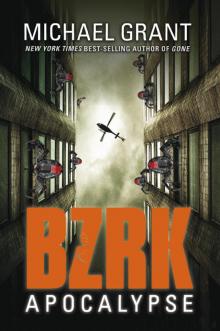 BZRK: Apocalypse
BZRK: Apocalypse Bzrk
Bzrk Love Sucks and Then You Die
Love Sucks and Then You Die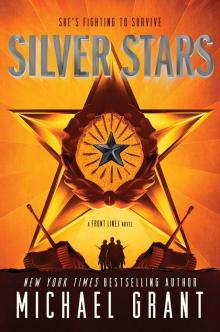 Silver Stars
Silver Stars The Key
The Key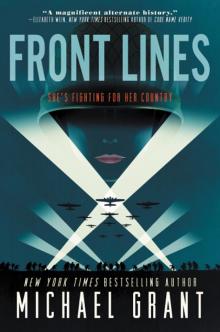 Front Lines
Front Lines BZRK Origins
BZRK Origins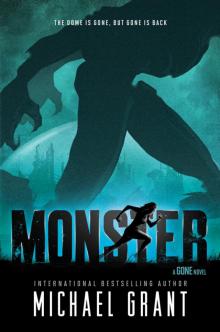 Monster
Monster Gone
Gone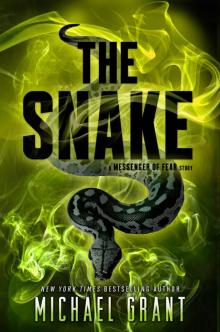 The Snake
The Snake The Power
The Power Hunger
Hunger Lies
Lies A Sudden Death in Cyprus
A Sudden Death in Cyprus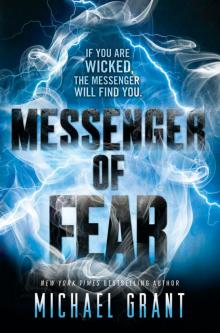 Messenger of Fear
Messenger of Fear Eve & Adam
Eve & Adam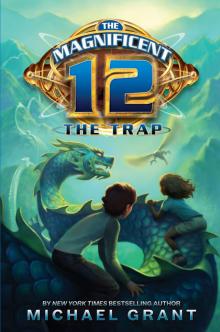 The Trap
The Trap Light
Light An Artful Assassin in Amsterdam
An Artful Assassin in Amsterdam The Call
The Call Hero
Hero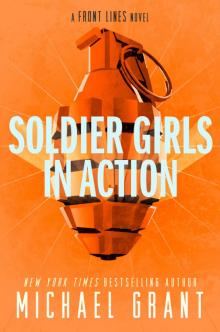 Soldier Girls in Action
Soldier Girls in Action Purple Hearts
Purple Hearts The Tattooed Heart
The Tattooed Heart The Fall of the Roman Empire
The Fall of the Roman Empire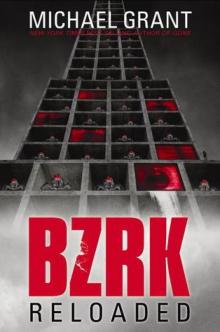 BZRK Reloaded
BZRK Reloaded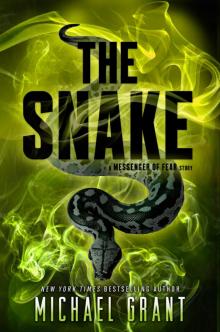 Messenger of Fear Novella #1
Messenger of Fear Novella #1 The Magnificent 12
The Magnificent 12 Fear: A Gone Novel
Fear: A Gone Novel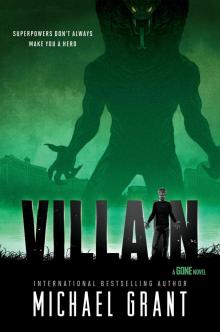 Villain
Villain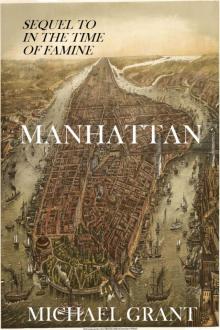 Manhattan
Manhattan Eve and Adam
Eve and Adam Plague: A Gone Novel
Plague: A Gone Novel Fergie Rises
Fergie Rises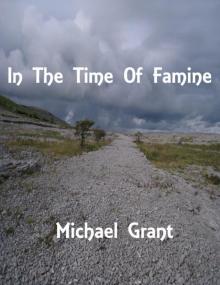 In the Time of Famine
In the Time of Famine Hunger_A Gone Novel
Hunger_A Gone Novel Lies g-3
Lies g-3